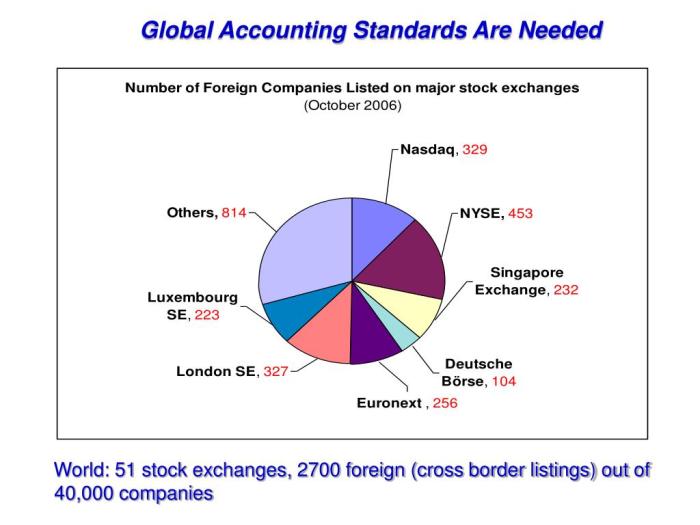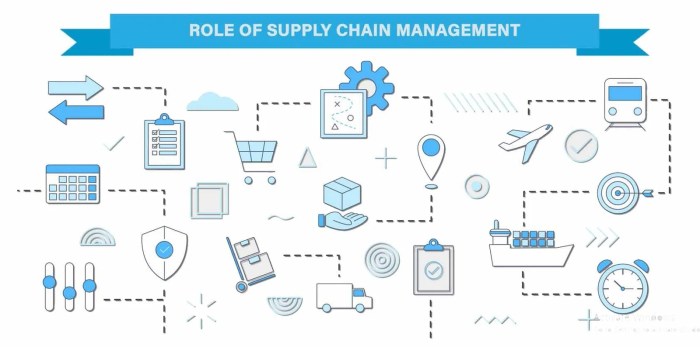The Influence of Global Accounting Standards on Cross-Border Trade is a critical area impacting global commerce. This exploration delves into how standardized accounting practices, such as IFRS and US GAAP, influence financial reporting transparency, investment decisions, and capital flows across international borders. We will examine the benefits and challenges of harmonizing these standards, considering cultural differences and technological advancements that shape their effectiveness.
Understanding the interplay between accounting standards and international trade is crucial for businesses operating globally. Inconsistencies in accounting methods can create barriers to trade, impacting investor confidence and the cost of capital. This analysis will shed light on these complexities, providing insights into the ongoing efforts to improve global accounting standard convergence and the potential role of technology in enhancing cross-border financial transactions.
Introduction to Global Accounting Standards and Cross-Border Trade
The increasing globalization of business has necessitated the development of harmonized accounting standards to facilitate cross-border trade and investment. Inconsistencies in accounting practices across nations create significant challenges for investors, lenders, and businesses engaging in international transactions. The evolution of global accounting standards aims to mitigate these challenges by providing a common framework for financial reporting, enhancing transparency, and promoting comparability.
The evolution of global accounting standards has been a gradual process, driven by the need for greater transparency and comparability in financial reporting across borders. Early attempts at harmonization were largely unsuccessful due to the diverse accounting traditions and regulatory environments in different countries. However, the establishment of the International Accounting Standards Committee (IASC) in 1973, later evolving into the International Accounting Standards Board (IASB) in 2001, marked a significant turning point. The IASB’s development and issuance of International Financial Reporting Standards (IFRS) have significantly impacted international commerce, providing a widely accepted set of accounting principles for publicly traded companies in many jurisdictions. This increased comparability has improved investor confidence and facilitated cross-border capital flows.
Key Differences Between IFRS and US GAAP
International Financial Reporting Standards (IFRS) and US Generally Accepted Accounting Principles (US GAAP) represent two major global accounting frameworks. While both aim to provide a consistent basis for financial reporting, significant differences exist. IFRS is principles-based, emphasizing professional judgment and providing a broader range of acceptable accounting treatments. US GAAP, conversely, is more rules-based, offering more specific guidance and leaving less room for interpretation. These differences can have substantial implications for cross-border transactions, particularly in areas like revenue recognition, inventory valuation, and the treatment of intangible assets. For example, the differing approaches to lease accounting under IFRS 16 and US GAAP ASC 842 can lead to variations in reported assets and liabilities for companies with significant lease portfolios operating across multiple jurisdictions. These inconsistencies can complicate financial analysis and cross-border comparisons.
Examples of How Inconsistent Accounting Practices Hinder Cross-Border Trade
Inconsistencies in accounting practices can create significant obstacles to cross-border trade. Imagine a scenario where a US-based company is considering acquiring a European firm. If the European firm’s financial statements are prepared under a different accounting standard, comparing its financial performance with that of the US company becomes complex and potentially misleading. This can lead to difficulties in valuation, negotiation, and due diligence. Similarly, inconsistencies can make it challenging to obtain financing from international lenders who require comparable financial information across different jurisdictions. Furthermore, differences in tax accounting rules stemming from varying accounting standards can create significant complexities for multinational corporations operating across borders. A lack of standardized reporting can lead to difficulties in consolidating financial statements, increasing the cost of compliance and potentially hindering international expansion.
Comparison of Global Accounting Standards
The following table compares key features of three major global accounting standards: IFRS, US GAAP, and Chinese Accounting Standards (CAS).
| Feature | IFRS | US GAAP | CAS |
|---|---|---|---|
| Nature | Principles-based | Rules-based | Rules-based, with increasing principles-based elements |
| Level of Detail | Less detailed, allowing for more professional judgment | More detailed, providing specific guidance | Moderate detail, with increasing flexibility |
| Adoption | Widely adopted globally | Primarily used in the US | Used primarily in mainland China |
| Comparability | Generally high across IFRS adopters | Comparability with IFRS is improving but still presents challenges | Comparability with IFRS and US GAAP is improving but remains a work in progress |
Impact on Financial Reporting and Transparency
The adoption of global accounting standards, such as those issued by the International Accounting Standards Board (IASB), significantly impacts financial reporting and transparency in international business. By establishing a common set of rules and principles, these standards enhance comparability, reliability, and understandability of financial statements across different jurisdictions, fostering trust and facilitating cross-border transactions. This increased transparency is crucial for efficient capital allocation and sustainable economic growth in the globalized marketplace.
The harmonization of accounting practices reduces information asymmetry, a key challenge in international trade. Information asymmetry arises when one party in a transaction possesses more information than the other. In cross-border contexts, this imbalance can be significant due to differences in accounting standards, making it difficult for investors and creditors to assess the true financial health of foreign companies. Global accounting standards mitigate this by providing a common framework, leveling the playing field and promoting fairer competition.
Reduced Information Asymmetry Between Trading Partners
Global accounting standards play a crucial role in bridging the information gap between trading partners. By standardizing the way companies report their financial performance, these standards create a more level playing field. This increased transparency allows investors, lenders, and other stakeholders to make more informed decisions, reducing the risk associated with cross-border investments and transactions. For example, a US investor considering an investment in a German company can rely on the company’s financial statements prepared under IFRS to make a more informed comparison to similar US companies using GAAP. The comparability facilitated by global standards reduces uncertainty and promotes greater confidence in the investment process.
Improved Investment Decisions in Cross-Border Contexts
Improved financial reporting, facilitated by global accounting standards, directly leads to better investment decisions in cross-border contexts. Investors are more likely to invest in companies with transparent and reliable financial reporting, as it reduces uncertainty and risk. This increased investment flows into countries that adopt global standards, stimulating economic growth and development. For instance, the adoption of IFRS in many emerging markets has attracted significant foreign direct investment, as investors now have a greater degree of confidence in the accuracy and reliability of the financial information reported by companies in those markets. This increased investment can lead to job creation, technological advancements, and overall economic prosperity.
Benefits of Standardized Financial Reporting for Multinational Corporations
Standardized financial reporting offers numerous advantages for multinational corporations (MNCs). Consistent application of global standards across subsidiaries simplifies the consolidation of financial statements, reduces the cost of preparing multiple sets of financial reports under different national standards, and improves the efficiency of internal financial management.
- Reduced Reporting Costs: Preparing financial statements under a single set of standards eliminates the need for costly adjustments and reconciliations.
- Enhanced Comparability: Investors and analysts can easily compare the financial performance of MNC subsidiaries across different countries.
- Improved Investor Confidence: Transparent and reliable financial reporting attracts investors and lowers the cost of capital.
- Facilitated Cross-Border Mergers and Acquisitions: Standardized financial reporting simplifies the due diligence process and facilitates smoother transactions.
- Streamlined Internal Controls: A consistent accounting framework enhances the efficiency and effectiveness of internal control systems.
Influence on Investment Decisions and Capital Flows
Consistent global accounting standards significantly impact investment decisions and capital flows across borders. The harmonization of accounting practices reduces information asymmetry between multinational corporations (MNCs) and international investors, fostering greater transparency and facilitating cross-border investment. This, in turn, influences foreign direct investment (FDI) flows and the cost of capital for companies operating globally.
The increased comparability of financial statements resulting from globally adopted standards allows investors to more easily assess the financial health and performance of companies in different jurisdictions. This reduces the perceived risk associated with international investments, leading to increased capital flows towards countries with strong accounting regulatory frameworks.
Foreign Direct Investment Flows and Consistent Accounting Standards
Consistent accounting standards directly influence foreign direct investment (FDI) flows by reducing information costs for potential investors. When financial statements are prepared using a common set of rules, investors can more easily compare the performance of companies across different countries. This reduces the uncertainty and risk associated with international investments, encouraging greater FDI inflows. For instance, countries that have adopted International Financial Reporting Standards (IFRS) have often seen an increase in FDI, as investors perceive them as more transparent and less risky investment destinations. The reduction in information asymmetry also leads to more efficient allocation of capital globally.
Impact of Differing Accounting Standards on Investor Confidence
Differing accounting standards create significant challenges for investors considering cross-border investments. Inconsistencies in accounting practices make it difficult to compare the financial performance of companies across different countries, increasing the uncertainty and risk associated with international investments. This can lead to lower investor confidence and reduced capital flows towards countries with less transparent or less internationally recognized accounting standards. Investors may demand higher returns to compensate for the increased uncertainty, thus increasing the cost of capital for companies operating in these jurisdictions. The lack of comparability can also lead to market inefficiencies and hinder the efficient allocation of resources across borders.
Global Accounting Standards and the Cost of Capital for Multinational Companies
The adoption of global accounting standards, such as IFRS, can significantly affect the cost of capital for multinational companies. By increasing transparency and comparability, these standards can reduce the perceived risk associated with investing in these companies, leading to lower borrowing costs. Investors are willing to accept lower returns when they have greater confidence in the reliability and comparability of the financial information. Conversely, companies operating in countries with less developed or less internationally recognized accounting standards may face higher borrowing costs due to the increased perceived risk. This difference in cost of capital can have a significant impact on a company’s investment decisions and overall competitiveness in the global market. The ability to access cheaper capital gives MNCs operating under IFRS a competitive edge.
Correlation Between Accounting Standard Adoption and FDI Inflows
The following table illustrates a simplified correlation between the adoption of IFRS (or similar high-quality standards) and FDI inflows for selected countries. Note that this is a simplified representation and other factors significantly influence FDI. The data presented should be considered illustrative and not exhaustive. A thorough analysis would require controlling for many other economic and political factors.
| Country | IFRS Adoption (Year) | FDI Inflow (USD Billion, Approximate Average Annual Inflow in Post-Adoption Period) | Notes |
|---|---|---|---|
| United Kingdom | 2005 | 100-150 | Already had strong accounting standards, IFRS adoption solidified investor confidence. |
| Australia | 2005 | 50-100 | Significant FDI inflow, partly attributable to the adoption of IFRS. |
| China | Gradual Adoption (2006-Present) | 200-300+ | Large economy, FDI inflow driven by many factors beyond accounting standards alone. |
| Brazil | 2010 | 40-80 | IFRS adoption contributed to improved investor sentiment, though other factors are significant. |
Challenges and Limitations of Global Accounting Standards

The adoption and enforcement of global accounting standards, while aiming for increased transparency and comparability in financial reporting, face significant hurdles. These challenges stem from a complex interplay of jurisdictional differences, inherent ambiguities within the standards themselves, and the influence of diverse cultural norms. Successfully navigating these obstacles is crucial for fostering trust and confidence in international financial markets.
Implementing and enforcing global accounting standards across diverse jurisdictions presents considerable difficulties. Significant variations exist in legal frameworks, regulatory capabilities, and enforcement mechanisms across countries. For example, a robust regulatory body in one nation might be less effective in another, leading to inconsistencies in the application and interpretation of standards. Moreover, the resources available for monitoring and enforcement vary greatly, impacting the effectiveness of compliance efforts. This uneven enforcement can create a competitive disadvantage for businesses operating in jurisdictions with stricter regulations.
Inconsistencies and Ambiguities in Global Accounting Standards, The Influence of Global Accounting Standards on Cross-Border Trade
Despite efforts towards harmonization, certain areas within global accounting standards remain susceptible to differing interpretations. The complexity of the standards themselves contributes to this issue, leaving room for subjective judgments and potentially inconsistent application. For instance, the valuation of intangible assets, such as intellectual property, often involves significant judgment calls, which can lead to variations in reported figures across companies and jurisdictions. Furthermore, the evolving nature of business models and financial instruments sometimes outpaces the development of accounting standards, creating gaps that need to be addressed. This necessitates ongoing revisions and updates to the standards to maintain their relevance and effectiveness.
Cultural Differences and the Acceptance of Global Accounting Standards
Cultural differences significantly impact the acceptance and application of global accounting standards. Accounting practices are often deeply embedded within a nation’s cultural and societal context. For example, some cultures prioritize long-term relationships and trust, while others emphasize short-term gains and precise quantification. These contrasting values can influence how accounting information is perceived, prepared, and used. Moreover, differences in language and communication styles can lead to misunderstandings and inconsistencies in the interpretation and application of standards. This highlights the need for culturally sensitive training and educational programs to ensure a more consistent and effective implementation of global accounting standards.
The potential limitations of current global accounting standards in addressing the complexities of cross-border trade are numerous.
- Difficulty in capturing the nuances of diverse business models: Global standards may struggle to accommodate the unique characteristics of businesses operating across various sectors and jurisdictions, leading to incomplete or misleading financial reporting.
- Inadequate treatment of intangible assets: The valuation of intangible assets, crucial for many modern businesses, remains a challenge, leading to inconsistencies and difficulties in cross-border comparisons.
- Limited consideration of country-specific risks: Global standards may not adequately reflect the diverse risks associated with operating in different countries, potentially leading to an incomplete picture of a company’s financial health.
- Challenges in dealing with transfer pricing: Determining appropriate transfer pricing for transactions between related parties across borders remains a complex and contentious issue, impacting the accuracy of financial reporting.
- Enforcement challenges across jurisdictions: Ensuring consistent enforcement of global standards across diverse legal and regulatory environments is difficult and crucial for effective application.
Future Directions and Developments
The ongoing evolution of global accounting standards aims to enhance the comparability and reliability of financial information across borders, ultimately fostering greater trust and efficiency in international trade and investment. Several key areas are driving this evolution, encompassing technological advancements and ongoing efforts to address persistent challenges.
The future of global accounting standards hinges on several key developments. Increased harmonization, driven by organizations like the IASB, will continue to reduce discrepancies in reporting practices, making cross-border comparisons more meaningful. This will involve not only refining existing standards but also proactively addressing emerging issues related to new business models and technologies. Furthermore, a greater emphasis on sustainability reporting is anticipated, reflecting the growing importance of environmental, social, and governance (ESG) factors in investment decisions and corporate accountability.
Technological Advancements in Cross-Border Financial Reporting
Technology, particularly blockchain technology, offers significant potential to revolutionize cross-border financial transactions and reporting. Blockchain’s inherent transparency and immutability can enhance the accuracy and reliability of financial data, reducing the risk of fraud and manipulation. Imagine a system where all financial transactions related to a cross-border trade deal are recorded on a shared, secure blockchain ledger. This would provide all parties involved – buyers, sellers, banks, and regulatory bodies – with real-time visibility into the transaction’s progress and status, minimizing disputes and streamlining the process. Beyond blockchain, artificial intelligence (AI) and machine learning (ML) can automate many aspects of financial reporting, reducing manual effort and improving the efficiency of audits and compliance checks. The use of these technologies will not only speed up processes but also allow for more sophisticated analysis of financial data, potentially leading to earlier identification of risks and opportunities.
Addressing Challenges in Global Accounting Standard Convergence
Despite significant progress, challenges remain in achieving full convergence of global accounting standards. One persistent issue is the diversity of national accounting cultures and regulatory frameworks. Some countries may be reluctant to fully adopt IFRS due to concerns about national sovereignty or the potential impact on domestic businesses. Another challenge lies in the complexity of IFRS itself; the standards are extensive and require significant expertise to implement correctly, creating a barrier for smaller businesses and developing economies. Ongoing efforts to simplify and clarify the standards, coupled with increased training and support, are crucial to overcome these hurdles. International collaboration and dialogue between standard-setters, regulators, and stakeholders are vital to fostering a shared understanding and commitment to global convergence.
Hypothetical Scenario: Improved Global Accounting Standards Facilitating a Cross-Border Trade Deal
Consider a hypothetical scenario involving a large-scale infrastructure project between a European company and a developing nation in Southeast Asia. The project requires significant investment and financing from multiple international sources. Without harmonized accounting standards, evaluating the financial health and risk profile of the involved parties would be extremely complex and time-consuming, potentially delaying or even derailing the project. However, with improved global accounting standards, all financial statements would be prepared using a common framework (e.g., IFRS). This would allow investors and lenders to readily compare the financial positions of the European company and the Southeast Asian entities, enabling a more efficient and transparent due diligence process. The increased transparency would also reduce information asymmetry, leading to more favorable financing terms and a smoother overall transaction. The successful completion of this project, facilitated by harmonized accounting standards, would not only generate economic benefits for both parties but also serve as a powerful example of the positive impact of global accounting standard convergence on international trade.
Case Studies: The Influence Of Global Accounting Standards On Cross-Border Trade
This section presents specific examples illustrating the influence of global accounting standards on cross-border trade, focusing on mergers and acquisitions, accounting practice adaptations, and comparative analyses of transactions under different standards. These case studies highlight both the benefits and challenges associated with the adoption and implementation of global accounting standards in an international context.
GlaxoSmithKline’s Acquisition of Stiefel Laboratories
GlaxoSmithKline (GSK), a British multinational pharmaceutical company, acquired Stiefel Laboratories, a US-based dermatology company, in 2009. This cross-border acquisition demonstrates the significant impact of International Financial Reporting Standards (IFRS) on financial reporting and valuation. The transaction involved complex accounting considerations, including the fair value measurement of acquired assets and liabilities, the allocation of purchase price to identifiable assets and liabilities, and the accounting treatment of intangible assets like brand names and customer relationships. GSK, already reporting under IFRS, applied these standards consistently throughout the acquisition process, providing a transparent and comparable view of the transaction’s financial implications to its global investors. The consistent application of IFRS facilitated a smoother integration process and ensured a more accurate reflection of the acquisition’s financial impact on GSK’s consolidated financial statements.
Adaptation of Accounting Practices by Unilever
Unilever, a British-Dutch multinational consumer goods company, operates in numerous countries and adheres to a variety of local Generally Accepted Accounting Principles (GAAP) and IFRS. To streamline its global financial reporting and enhance comparability across its diverse operations, Unilever implemented a comprehensive program to harmonize its accounting practices with IFRS. This involved significant changes in its internal control systems, training programs for accounting personnel, and the development of new accounting policies. The transition to IFRS required substantial investment in IT infrastructure and skilled personnel. However, this adaptation resulted in improved financial reporting transparency, increased investor confidence, and reduced the complexity of consolidating financial results from diverse subsidiaries. The improved consistency and comparability of financial information across Unilever’s global operations significantly facilitated decision-making at the corporate level and enhanced its overall financial management.
Comparative Analysis: Treatment of Research and Development Costs
Under IFRS, research costs are expensed as incurred, while development costs are capitalized if certain criteria are met. In contrast, US GAAP generally requires expensing of both research and development costs. Consider a hypothetical scenario where a US-based company acquires a German company that is developing a new pharmaceutical product. If the acquisition is accounted for under US GAAP, the acquired development costs would be expensed, potentially reducing the reported value of the acquisition. However, if IFRS is applied, those same development costs could be capitalized if they meet the specific criteria, leading to a higher reported asset value and potentially impacting goodwill calculations. This difference in accounting treatment directly affects the financial statements, valuation, and ultimately the investment decisions made by stakeholders. This discrepancy highlights the importance of understanding the differences in accounting standards when evaluating cross-border transactions.
Key Findings from Case Studies
| Case Study | Accounting Standard Applied | Impact on Financial Reporting | Impact on Cross-Border Trade |
|---|---|---|---|
| GlaxoSmithKline’s Acquisition of Stiefel Laboratories | IFRS | Enhanced transparency and comparability of acquisition valuation; facilitated smoother integration. | Facilitated cross-border acquisition by providing a consistent framework for financial reporting and valuation. |
| Unilever’s IFRS Adoption | IFRS | Improved financial reporting transparency and consistency across global operations; enhanced investor confidence. | Streamlined global financial reporting, reducing complexity and improving decision-making. |
Final Conclusion

In conclusion, the influence of global accounting standards on cross-border trade is multifaceted and far-reaching. While the adoption of standardized practices like IFRS offers significant benefits in terms of transparency and investor confidence, challenges remain in implementation and enforcement across diverse jurisdictions. The ongoing pursuit of convergence, coupled with technological innovations, promises a future where global accounting standards further facilitate efficient and transparent cross-border commerce. Addressing the remaining inconsistencies and promoting greater understanding of these standards will be vital for fostering sustainable global economic growth.
Clarifying Questions
What are the main differences between IFRS and US GAAP?
IFRS and US GAAP differ in their approaches to revenue recognition, inventory valuation, and the treatment of certain assets and liabilities. These differences can significantly impact financial reporting and comparability across borders.
How do global accounting standards impact small and medium-sized enterprises (SMEs)?
Adopting global accounting standards can be challenging for SMEs due to resource constraints and complexity. However, compliance can enhance their credibility and attract foreign investment.
What role does the IASB play in global accounting standard setting?
The International Accounting Standards Board (IASB) is responsible for developing and issuing IFRS, aiming to create a globally consistent framework for financial reporting.
Understand how the union of Step-by-Step Guide to Preparing a Balance Sheet can improve efficiency and productivity.









